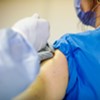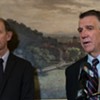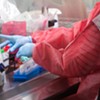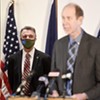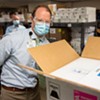click to enlarge 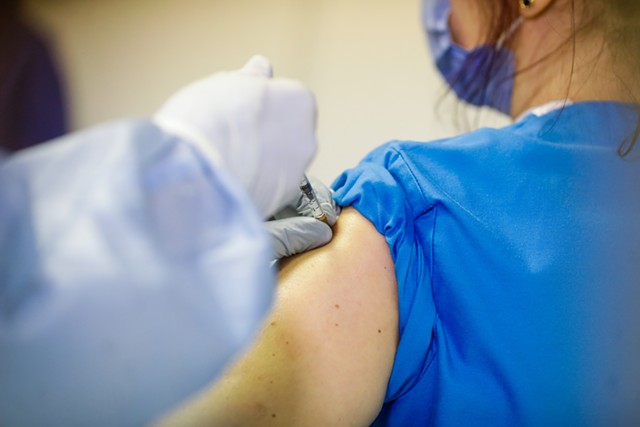
- Cateyeperspective | Dreamstime.com
- A patient receiving a vaccine dose
Updated at 4:50 p.m.
Vermont has followed federal recommendations to suspend the use of the Johnson & Johnson COVID-19 vaccine, but officials delivered an upbeat message Tuesday at the administration's twice-weekly news briefing.
“This is a bump in the road in terms of the Johnson & Johnson pause,” said Gov. Phil Scott.
The U.S. Centers for Disease Control and Prevention reported early Tuesday that six women between ages 18 and 48 suffered a type of blood clot called cerebral venous sinus thrombosis, six to 13 days after receiving the vaccination. More than 6.8 million doses of the Johnson & Johnson vaccine had been administered in the U.S. as of April 12, the CDC said.
The CDC recommended that states suspend Johnson & Johnson vaccinations, and Vermont is one of several that did so, officials said.
“But we’re still, even without the J&J vaccine, going to vaccinate more than 20,000 people this next week,” said the governor. “Think about how far we have come. Three to four months ago, we didn’t even have a vaccine in place. We should be proud of what we are doing. I believe J&J will be back online sooner rather than later.”
The Health Department is now reaching out to about 4,000 Vermonters who were scheduled for a Johnson & Johnson shot to make an appointment for the other two vaccines available: Pfizer-BioNTech's and Moderna's.
The CDC and the Food and Drug Administration are meantime reviewing the safety of the Johnson & Johnson vaccine.
“Until that process is complete, we are recommending a pause in the use of this vaccine out of an abundance of caution,” the governor's office tweeted. “This is important, in part, to ensure that the health care provider community is aware of the potential for these adverse events and can plan for proper recognition and management due to the unique treatment required with this type of blood clot.”
The CDC said people who have received the Johnson & Johnson vaccine and develop severe headache, abdominal pain, leg pain, or shortness of breath within three weeks should contact their health care provider.
Vermont has been administering COVID-19 vaccines since mid-December. The state Department of Health reported that 48 percent of Vermonters had received at least one dose of vaccine as of Tuesday. In all, 174,000 Vermonters have been fully vaccinated — including more than 11,000 who were vaccinated on a single day last week.
An outbreak at the Newport prison has abated, with no new positive cases among inmates, although a new inmate at the Springfield prison tested positive, officials said.
Statewide, 233 people had died of COVID-19 as of Tuesday, and the positivity rate had dropped slightly, to 1.8 percent. The state’s seven-day new case average had fallen 23 percent, but continues to hit between 100 and 200 new cases each day.
Health Commissioner Mark Levine sought to reassure Vermonters who have already received the Johnson & Johnson single-shot vaccine, as well as others who might hesitate to use any of the vaccinations in light of the CDC recommendations. He said the risk of people with COVID-19 of facing serious long-term symptoms is somewhere between 1 and 10 percent.
“As far as we know, the risk of J&J complications stands at 6 cases out of 6 million doses,” said Levine. “Just think about that in comparison to the unfortunately tragic calculations we have in this country of your risk of being a death statistic from COVID, which is about one in 500.”
None of the blood clot cases occurred in Vermont, Levine said.
New U.S. Census Bureau survey data indicates nearly 85 percent of Vermonters say they will definitely or probably get vaccine. The survey was of people who are not yet vaccinated, said Finance Commissioner Mike Pieciak.
Vaccination registration opened for people ages 30 and over on Monday. On April 19, registration will open for anyone over age 16.
Levine and others are promoting vaccination to people in their 20s, a population whose cases have been spiking over the last few weeks. Levine said he wasn’t happy to see photos that circulated on social media last weekend of a dense crowd of merrymakers enjoying the sunshine— unmasked — on Burlington’s North Beach.
That age group has a disproportionately high number of cases, said Pieciak.
The scene at the crowded beach was not unique, said Levine.
“It’s probably just one example of many going on throughout the state, certainly around the country, as warmer weather arrives,” he said, adding that he understands and empathizes with those who are tired of spending time alone. “But I was really disappointed to see such a blatant disregard for the rules,” he said. “This kind of behavior, it’s just not Ok right now. Not by young people, not by middle-age or older adults, not by anyone. We’ve told you there’s going to be a time to return to large gatherings. Just not in April of 2021.”
Levine reminded younger listeners that while severe COVID-19 complications are typically more common in older people, young people can become seriously ill as well. He added that long-term symptoms such as fatigue and brain fog can be onerous, and that the sooner all are vaccinated, the sooner society’s overall COVID-19-related dread will dissipate, and social activities will resume.
The crowning incentive: “There might be a creemee coupon awaiting you at the vaccine site as things go along in the near future,” he said.
Asked if the removal of the Johnson & Johnson vaccine would have an impact on the state’s plans to largely reopen by July 4, Gov. Scott said it was too early to know.
“We are four to five hours into this,” he noted. "... We’ll know more in the next day or two.”





































